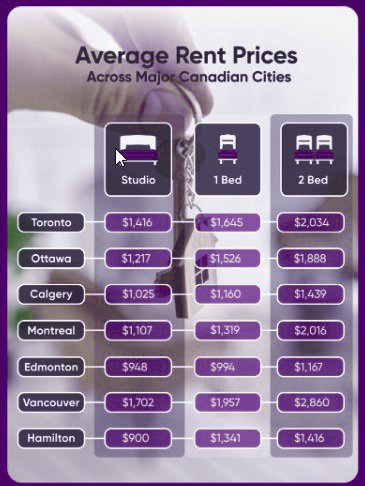Your First Week in Canada
With dreaming, waiting, and plenty of time spent planning behind you, the time has finally arrived. You’ve made it to Canada, otherwise known as America’s Hat, the Great White North, or Canuckistan, which are just a few of the many popular names the country has. A congratulation sure is in order.
- Date: 01/13/2023 07:37 PM
- . Vancouver, BC, Canada (Map)
Description
While unloading your luggage from the plane, you stop and think, “Wow, I finally did it. My Canada life is about to begin!”
Yes, you have, and the future looks brighter than ever before, but now that you are living in Canada, what’s next? And, is there even a manual designed for people from all over the world on what to do next once they have arrived in Canada? Luckily, the answer is yes, and while you can’t do everything you need to do all at once, you can mark off a couple of the most important things on your big to-do list. That is if you took the time to plan.
If you haven’t planned yet, there is no need to fret either. This list will get you started on some of the biggest tasks and matters that you need to settle before embarking on some of your best explorative adventures yet! While you can’t get everything done all in one go, you can start right here with our list of the most important things to do in your first week as a new Canadian citizen.
6 Things to Do Once You Arrive in Canada

Once you’ve arrived in Canada, which is basically a new life you get to design all on your own or with the person or multiple people you’ve moved with, you get to adopt an “out with the old and in with the new” approach.
This is a wonderful time of your life and one that no one can take away from you. Since you’ll experience this one moment of newness in Canada only once in your life, remember to not stress too much about everything that you need to get done. There is no rush, and if there is, you’re probably doing it wrong, so stop and take a deep breath, acknowledge the moment as a beautiful endeavor, and then continue.
Oh, and don’t forget to grab a cup of coffee before you start. In fact, here are some of the best coffee shops scattered around Canada, but if you want to try a Canada favorite, order a Tim Horton’s coffee from over 4,800 restaurants in the country. Enjoy!

Right, now that you have your coffee, there are 6 things you need to do in your first week in Canada:
1. Get a SIN
The first and most important thing you need to do when you arrive in Canada is to get your Social Insurance Number, otherwise known as SIN. This needs to be done as soon as you get to Canada as you can’t get a job without it. A SIN also provides you with many benefits, along with government services that you can’t access without it. Your SIN number is a nine-digit number that is similar to a National Insurance Number in the UK, a Personal Public Service (PPS) number in countries like Ireland, or a Tax File Number in Australia
If you received a temporary work permit and it was successful, you will see the 9-digit number displayed on your permit documents. Alternatively, you can apply for the SIN at a Service Canada office, which should not take more than 30 minutes to an hour to get settled. Be sure to remember either your work or study permit with you if you have one.
2. Set Up a Bank Account
While learning more about the cost of living in Canada, which you’ve probably been doing for a while now, don’t forget to set up a bank account because even if you have a couple of hundred dollars of cash on you, there’s no doubt that you will need to use a bank card soon.
Canada has 88 banks and 5,820 branches nationwide. Needless to say, no matter where you are moving to, you’ll find a bank close to you in no time, which means that you won’t feel too overwhelmed when looking for a bank in your first week. When you are looking for a bank, however, you need to look at a few options and not just settle with the first one that you come across. That’s because, although banking in Canada at any bank is super convenient, there are bank charges involved that may be much higher than what you are used to. And, when in Canada, it’s necessary to save money wherever you can, which is why checking out a few more bank options is the best way to go.
Keep in mind that every bank will have monthly fees with their chequing accounts. On average, Canadians spend $220 on bank fees annually.
3. Get Your Cellphone Sorted
Research, research, and more research. You must be quite over it now, which is why instead of spending so much time comparing phone plans, especially when you’ve just stepped off the plane to find a hotel or drive to your new home, you should buy a new cell phone in Canada. Even though many people would not find getting a new phone as the ideal option, it can help you reduce the roaming costs from the internet provider at your new home.
Should you only have a temporary visa, you should make sure that your cell phone contract duration aligns with that period. When you buy a new cell phone, it is necessary to check whether additional charges will incur on the given phone plan, which can include receiving local calls and caller ID costs.
4. Find a Home and Seal the Deal
If you have arrived in Canada and don’t have a house or apartment of your own yet, then one of your top priorities in your first week should be to find a place you can rent and sign a contract for it. Even if you’re just planning on signing a month-to-month lease until you start your job in Canada, there are many apartment rental options available to choose from.
As an immigrant, you likely don’t have a Canadian credit history. It’s also unlikely that you could have any local references, which may place you at a disadvantage. That’s because some landlords are prone to give people with a Canadian credit history preference above anyone else. However, this is not always the case. Should you be rejected from a landlord, all that you must do is continue to search for one that will be willing to give you a lease, regardless of your credit history. When you look for a house or apartment to rent, it helps to make inquiries with a Canadian cell phone, as this makes it far more likely for Canadian landlords to answer the phone than those who are receiving a call from abroad.
You can also find listings on Craigslist, Padmapper, and Kijiji if you struggle to find a listing that doesn’t require a Canadian credit score. Nevertheless, there will be listing options available for immigrant newcomers in Canada on the property listing websites too.

5. Find a Friend, and Then a Couple More
Once you arrive in Canada, you will have to make time to connect with people in your suburb or with your colleagues at your job, if you already have a job. In the case that you’re studying in Canada, you can meet a lot of students and befriend them, which is necessary, especially if you don’t have family moving with you to Canada.
Apart from your work, study, or home environment, some of the best ways to meet new and interesting people require you to get involved in different activities or perhaps local groups. Whether it is playing a sport, visiting a church, or getting involved in events and community get-togethers, there is more than one way to make friends. Finding people you get along with well will aid in your journey to discovering the city or area you live in, explore more, and become acquainted with what it’s like to be a true Canuck in Canada.
Sometimes getting to know new people will also open your doors to new opportunities in Canada and provide you with a city guide, depending on where you live. This will also aid on your journey to make smarter decisions when it comes to spending and could help you to lower your cost of living in Canada.
6. Be Realistic, But Kind to Yourself
When you arrive, likely, you won’t have a place to rent yet. In this case, when you arrive, you will need to have a place to stay. Since you probably don’t have a clue about where to go in the city or province you’re going to live in, understand that it is normal to feel overwhelmed. The journey you are about to start is an exciting one, and so, you should approach it with a deep breath.
Since you will likely be jet-lagged, make an effort to relax as soon as you arrive in Canada. Take some time to yourself instead of rushing to get somewhere fast or get things in order. You have time to figure out everything you have to do, and also time to learn about everything that you need to know. Whenever you do feel like you are overwhelmed, remember why you decided to live in Canada and remind yourself that, “Well, what do you know? I made it!”, because you did. You’re standing in America’s hat and that’s an achievement on its own no matter where in the world you came from to be in Canada. Instead of worrying or being stressed about anything, site-see in Canada or try doing something you’ve always wanted to do but never had the chance to do.
Above all else, be kind to yourself. Adding a heavy load on your shoulders once you arrive is no way to start this incredible journey.
As soon as you’ve taken the time needed to recover from your flight and settle into your new home, while you are being kind to yourself, also be realistic as there may be a lot of things that you will have to get done once you feel ready to do so.
Pre-Arrival Programs to Prepare You for the Big Move

If you haven’t moved to Canada yet and are set to do so soon, then you still have time to prepare and plan for the big move. Although it is not necessary, it sure does help to pull your Canada life a little bit together before you take a flight to your new country of residence.
Pre-arrival services can be used to your advantage before you arrive in Canada. These programs are online-based programs that you can gain access to once you have received a Confirmation of Permanent Residence (CORP) letter that states that you are eligible to move to Canada.
Top Canadian General Pre-Arrival Programs:
1.Planning for Canada - A free orientation session, one in-person and one online. This program is provided by the Canadian Orientation Abroad (COA) and the Canada Immigrant Integration Program (CIIP). It is offered to economic and family-class immigrants globally, and grants access to information, contacts, and resources that help you and your family members to succeed in a Canadian work environment and community.
2.Prep Can- A program that offers free employment services to immigrants with PR visa holders before coming to Canada. The program focuses on researching labour market information, interview skills development, labour market information, and job searches.
3.Settlement Online Pre-Arrival (SOPA) - A free pre-arrival job readiness and retention program that includes resources and courses that are free of charge. This includes a one-on-one orientation, referrals to post-arrival services, work environment culture training, and job search support.
4.Next Stop Canada - Pre-arrival settlement services for YMCA of Greater Toronto, which provides personalized settlement resources and information for immigrants that are set to arrive in Canada soon. Topics include health, education, housing, language, employment, and much more. The program also has a mentorship program available, which allows you to connect with one or more people that are already living in Canada.
5.Active Engagement and Integration Project (AEIP) - This program is focused on providing services like one-on-one consultation and workshops for employment, foreign credential recognition to healthcare and housing, as well as much more. It offers community engagement programs and employer support, which will be two very necessary elements that will help you in your first week in Canada.
Get Ready to Live Your Best Life
Life in Canada may be something you have been dreaming about for a while, even if you didn’t even know what Canada was like before but have heard about the incredible lifestyle the country has to offer.
If you have managed to make it to the greatest country in the world, there are countless opportunities that await you. As you embark on your new and exciting journey, don’t forget to try out some of Canada’s… well, rather weird habits.
If you’re up for some fun, why not try some of the weird things that only seem to take place in Canada in your first week as a Canadian citizen? Nothing will leave you feeling more at home than becoming a part of the Canadian culture.
If you have not applied for permanent Canadian residency yet or are yet to complete your paperwork and process your application, why not consult a professional? Our Regulated Canadian Immigration Consultants (RCICs) are approved by the Canadian government and ready to help you to become a real Canuck.



